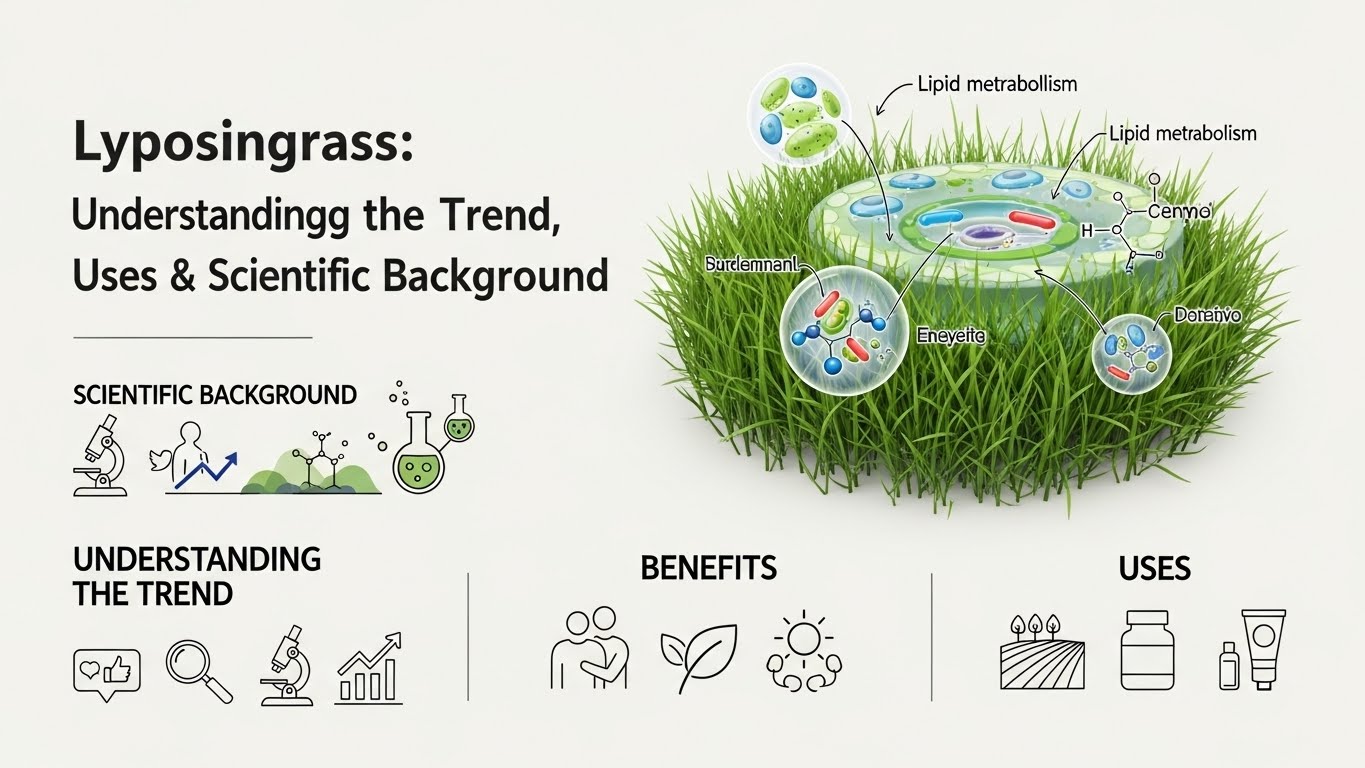The wellness world is constantly evolving, with new ingredients, natural extracts, and compounds gaining attention for their potential benefits. One of the emerging terms circulating in health forums and alternative wellness discussions is Lyposingrass. Although still relatively new and not widely documented in mainstream scientific literature, Lyposingrass has gained curiosity due to its association with metabolism support, natural detoxification, and botanical wellness applications.
This article explores what Lyposingrass is believed to be, the science-inspired theories behind its functions, potential benefits, and the cautions users should consider before integrating it into a wellness routine.
What Is Lyposingrass?
The term Lyposingrass is used to describe a hypothetical or emerging botanical compound believed by some wellness communities to support:
-
natural lipid metabolism
-
digestive harmony
-
energy balance
-
detoxification pathways
While the exact plant source or composition may vary depending on the context in which it is discussed, Lyposingrass is most often associated with plant-derived bioactive compounds that may influence fat utilization and metabolic function.
In short, Lyposingrass is viewed as a modern wellness ingredient inspired by traditional herbal systems and contemporary metabolic health trends.
Where Did the Concept of Lyposingrass Come From?
Although not yet an established scientific ingredient, the concept of Lyposingrass likely emerged from:
1. Interest in Natural Metabolism Support
Herbal formulas that support healthy lipid processing have been part of traditional medicine for centuries.
2. Growing Demand for Plant-Based Wellness Ingredients
Consumers increasingly seek botanical alternatives to synthetic supplements.
3. Online Health Communities
Discussions about metabolism, fat reduction, and natural energy boosters often lead to new trend terminology—Lyposingrass appears to be one of them.
4. Supplement Branding and Innovation
New products sometimes introduce unique blends under distinctive names to differentiate themselves in the market.
Theoretical Properties of Lyposingrass
Although research does not yet formally recognize Lyposin grass, descriptions typically associate it with compounds known to support:
1. Lipid Metabolism
Botanical extracts with flavonoids or polyphenols may help influence how the body processes and mobilizes fat.
2. Antioxidant Support
Plant-derived antioxidants protect cells from oxidative stress, supporting overall wellness.
3. Digestive Balance
Certain grasses and herbal fibers support smoother digestion and nutrient absorption.
4. Energy and Vitality
Botanicals that influence metabolism often contribute to improved energy levels and physical endurance.
5. Detoxification
Some herbs support liver and kidney pathways involved in cleansing the body of metabolic byproducts.
Potential Benefits of Lyposingrass
1. Natural Metabolism Enhancement
Many consumers associate Lyposingrass with improved metabolic efficiency, making it appealing for those interested in weight balance.
2. Improved Digestive Well-Being
Like other plant fibers and herbal extracts, Lyposingrass may theoretically support smoother digestion.
3. Increased Energy Levels
Better metabolic function can translate to enhanced daytime energy and vitality.
4. Antioxidant Defense
Botanical compounds may help protect the body from environmental stressors.
5. Gentle Detox Support
If Lyposingrass contains cleansing herbal components, it could play a role in supporting the body’s natural detox systems.
How Lyposingrass May Be Used
While no standardized product form yet exists, similar botanical ingredients are often used as:
-
herbal teas
-
powdered supplements
-
capsules or tablets
-
smoothie additives
-
liquid tinctures
-
functional food ingredients
Usage depends heavily on the formulation and intended purpose.
Scientific Perspective: What We Know & What We Don’t
Since Lyposingrass is not yet an established scientific term, several points must be emphasized:
No peer-reviewed research
There are currently no clinical studies specifically referencing “Lyposingrass.”
Potentially inspired by known botanicals
Its described effects resemble those of well-studied herbs such as:
-
green tea extract
-
lemongrass
-
barley grass
-
dandelion
-
garcinia
-
ginseng
More investigation is needed
Before any claims can be validated, detailed research or ingredient clarification is essential.
Safety Considerations
Anyone interested in Lyposingrass should keep the following in mind:
Consult a healthcare professional
Especially if pregnant, nursing, or taking medications.
Start slow with any new botanical blend
To ensure no unexpected reactions.
Verify brand credibility
If purchasing a product labeled with Lyposingrass, choose reputable sellers with transparent ingredient lists.
Watch for allergens
Botanical combinations may include grasses or herbs that can trigger allergies in sensitive individuals.
Is Lyposingrass a Real Ingredient or a Trend?
At this stage, Lyposin grass appears to be an emerging or branded wellness concept rather than an established botanical ingredient.
Like many early-stage wellness terms, it may evolve into:
-
a commercial supplement,
-
a branded plant extract blend,
-
or a trending wellness keyword.
Regardless, consumer interest in natural metabolism support ensures that similar botanical solutions will continue to gain popularity.
Conclusion
Lyposingrass represents an intriguing concept within the world of natural wellness—combining the ideas of metabolic support, digestive function, antioxidant benefits, and botanical health traditions. While it is not yet recognized in formal research, its potential aligns with many plant-based health trends gaining momentum today.

